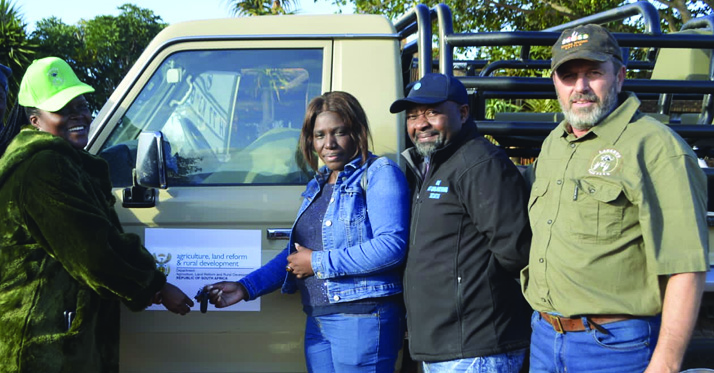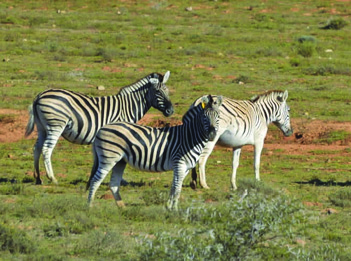Amabal’engwe Game Farm and Tourism, the first black-owned game farm in the Western Cape, hopes to soon offer accommodation, hunting and game viewing.
The Nico Lerm Trust and the Mossel Bay African Farmers Union (MAFU), as part of government’s land redistribution programme, established the farm, located in part of the Mossel Bay and Hessequa Municipalities, in 2016.
According to Vuyani Nkasayi, the Deputy Director: Communication Support Services at the National Department of Agriculture, Land Reform and Rural Development (DALRRD), R7 million was approved in the 2021/22 financial year for fencing and maintenance, staff accommodation, game, gear and equipment, training and vehicles for the game farm.
This funding ensured construction and upgrading of 28km of fencing which created jobs for locals.
A further R3.1 million has been made available by the department for the 2022/23 financial year, for equipment and the planting of five hectares of lucerne to supplement feed for the game, says Nkasayi.
Much of the Amabal’engwe Game Farm and Tourism’s success is due to a partnership between the Nico Lerm Trust and MAFU.
The Nico Lerm Trust belongs to experienced game farmer Nico Lerm.
The two organisations are an example of how well-established farmers and emerging farmers can work together to create jobs.
A passionate game farmer for more than 25 years, Lerm has five farms and has been mentoring the MAFU trust in game farming.
“Established farmers should assist and mentor emerging farmers as this will make South Africa a better place. Supporting emerging farmers will show citizens that we can work together. We need each other and can learn from each other. We must take our country to the next level so that the sun can shine on everyone in this beautiful country of ours,” says Lerm.
“Emerging farmers must ensure that their heart and soul are in farming. To make it a success, you must be willing to work very hard,” he adds.
Vuyiswa Skoen, the chairperson of MAFU, says the mentorship from Lerm helped the Union to learn more about game farming.
“We have been struggling with the farm for a long time and have been praying for answers. Lerm is guiding and supporting us to establish the farm, which will grow with us and become a legacy for our families and the community,” she adds.
The formation of the farm 
In the 1996/97 financial year, the DALRRD provided funding to the MAFU Communal Property Association (CPA) to buy farm Buffelskraal (now Amabal’engwe), as part of government’s Settlement Land Acquisition Grant.
At the time, the idea was to address Kwanonqaba residents’ grazing needs. However, as the land was located 80km away from where they lived, many beneficiaries were unable to access it, says Nkasayi.
In January 2013, the DALRRD joined forces with Lerm who was already a successful farmer in the Western Cape to drive the project forward and form Amabal’engwe with the MAFU CPA.
“When the Lerm Trust was approached to help emerging farmers, I spoke to my family and we wanted to get involved,” says Lerm.
Besides his expertise, Lerm provides the use of his vehicles, staff, tractors and administration support. He has also installed water points for the animals, built roads, erected fencing and supplied game.
“To date, the farm has received two vehicles, wire and poles to upgrade the fences and various equipment from the DALRRD,” says Lerm, who is managing the farm until the MAFU takes over.
Eventually, the farm will have R4.5 million worth of wildlife. Of this, 60% of the offspring will belong to MAFU and 40% to the trust.
Nkasayi says the project also aims to grow and develop marginalised producers to help alleviate poverty and ensure economic growth and job creation.
“The project will facilitate self-employment and improve the livelihoods of marginalised households within the CPA. Job opportunities and training are central to DALRRD’s investment,” says Nkasayi.
For more information about the Department of Agriculture, Land Reform and Rural Development visit www.dalrrd.gov.za/



 Facebook
Facebook Twitter
Twitter WhatsApp
WhatsApp